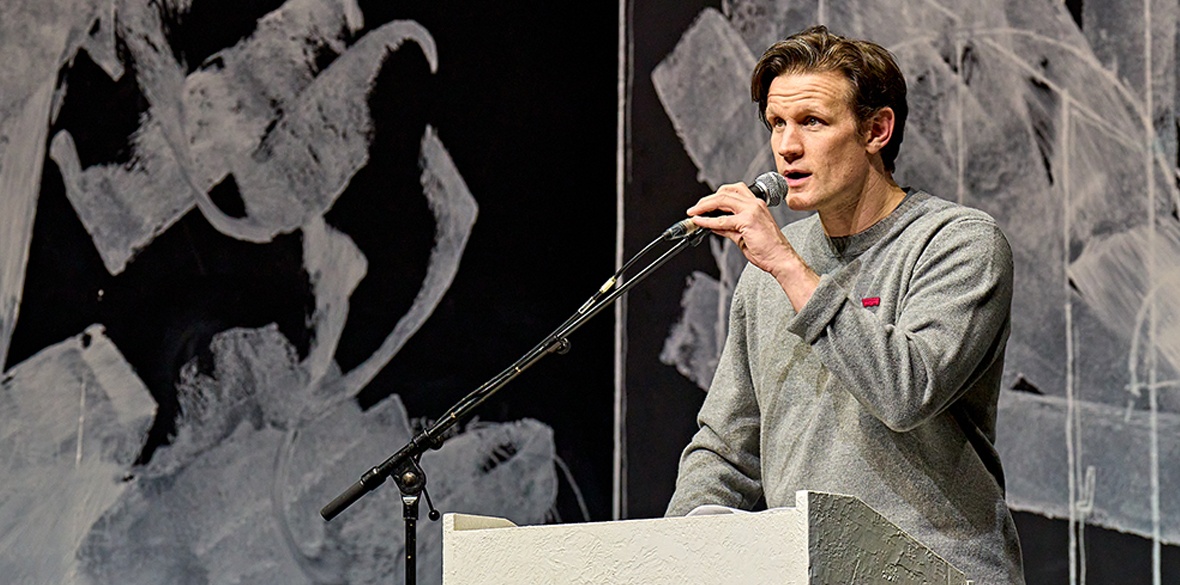This is the last article you can read this month
You can read more article this month
You can read more articles this month
Sorry your limit is up for this month
Reset on:
Please help support the Morning Star by subscribing here
An Enemy of the People
Duke of York’s Theatre, London
ONE proof of a great play is its longevity; another is the ease with which it accommodates daring new versions that mess with location, character, cultural background and time, while retaining the original spirit and dramatic force.
Ibsen’s 1882 work An Enemy of the People — now starring Matt Smith at the Duke of York’s — is one such example. Hurtling like a ballistic missile into the 2020s through a mixture of theatrical ingenuity and directorial panache, the play still asserts its central urgent narrative and moral core as if it had been written today.
The story is clear. Thomas Stockmann (Smith), resident medical officer in a provincial spa town, identifies serious contamination of the water, a crisis gravely threatening the health of locals and visitors alike. Stockmann is immediately deluged with pressure for silence from those with vested interests. These include his own brother: the town mayor and general political operator, and his father-in-law: a hard-nosed, local potentate with a fearsome alsatian in tow, whose effluents from his own tanning factory are a major cause of the pollution.
Stockmann’s shocking discovery brings to the fore his whistleblowing temperament, climaxing when he addresses a public meeting in the town hall, the defining scene.
And it is in this meeting that we feel the combined force of director Thomas Ostermeier and adaptor, dramaturg Florian Borchmeyer. For here the houselights blaze, the audience become the townsfolk, modern immersive theatre drowns out traditional stagecraft and Stockmann delivers a speech of blinding force, polemical in nature, but stirring us all to revolutionary fervour. His tirade against self-seekers and the liberal majority, dishonest politicians, failed democracy and even the Post Office confirms that this is a script revised for a modern English audience.
Other changes, too, proliferate. Stockmann and his wife, for instance, are played younger than in the original, with a baby instead of grown-up children. He chills by jamming with his pals and daubing walls with graffiti slogans; she, in a strangely disconnected moment, snogs pal Hovstad, the editor of the local newspaper. Where did this come from? Why no follow-up?
Some aspects of this luminous play are enhanced by the director, such as the ending which in this version is deeply truthful and unsettling. Other facets evidence directorial self-indulgence which shifts the play stylistically and interrupts the original author’s unerring sense of purpose. Oasis and David Bowie songs sung by the protagonist and his mates, for instance, hold up Ibsen’s immaculate momentum, and even the inventive town hall scene veers occasionally towards pantomime with some laughably forced references, such as updating the Post Office software.
The cast give solid performances with Paul Hilton memorably conniving as brother Peter, and Priyanga Burford chillingly real as local politico Alaksen. Smith himself, of course, effortlessly fills the shoes of the leading man.
Meanwhile Ostermeier and Borchmeyer, while bravely reimagining the play, too often disturb the master’s clarity and flow.
Overall, though, it’s great to see an unashamedly political play land in the West End when most needed.
And it reminds us just how brilliant Ibsen was.
Runs until April 13. Tickets: thedukeofyorks.com.










